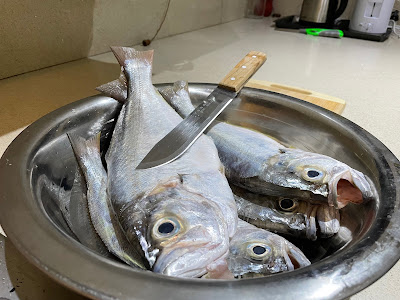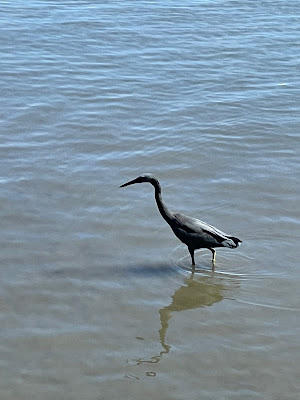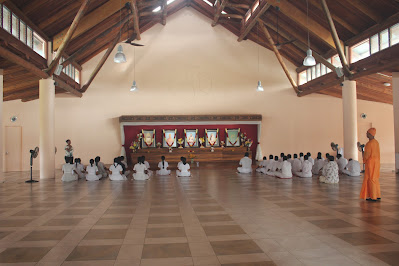 |
| Z is for Zuche, which means a tree stump. There are plenty around, as orchids are often grown on them. Also many tree bits are washed in on the beaches. |
 |
| More like the whole log than a stump...but you'll know what I mean. |
Zuche is just an excuse to zigzag into other stuff. All the things that I had learnt but for some reason or another couldn't put down here in the posts. Before I get into zipping things up with those, I just wanted to mention that Fiji is a biodiversity hotspot - there are 1700 plant species and 742 species of trees endemic to the islands. Ancient trees line the Queens Road and tower in Albert and Thurston Parks and gardens - absolutely awe inspiring and delightful at the same time, straight out of some fairy tale.
.jpg) |
| Queens Road to Lautoka. |
Okay, now let's just sum the things I wanted to tell you about but couldn't.
Adventure sports - lots of options if you are an adrenaline junkie, check out the link here.
.jpg) |
| Paragliding just outside Denarau. |
Baker, Thomas - a Methodist missionary who was killed and cannibalised in 1867 for touching a chief's head, which is considered disrespectful in the Fijian culture. Fijian missionary workers with Baker were also killed and eaten. In 2003, the villagers offered an apology to Baker's descendants in a formal reconciliation ceremony to lift the curse of the massacre from their village. Read more here.
Covid in Fiji - The pandemic totally flattened Fiji's tourism industry, but with their 'No jab, no job' policy and vaccine programmes they were able to lift restrictions and the tourists are back, everything is running normally. No masking required since April 2022. All travel restrictions for double vaccinated travellers lifted since February 2023, no tests required on arrival. Find the statistics on the pandemic in this table.
Dolphin watching - Spinner dolphins are found year round in Fiji. Check out this link to read about the best dolphin safaris.
Davui - is a conch shell, used as a trumpet/horn, blown as a signal in events of importance to gather people together in Fijian culture. Conch shells are blown in my native Bengal as a part of religious ceremonies - weddings, weaning, new baby coming home and also every morning and evening at the household shrines during daily prayers, so I was chuffed to find this connection.
Fish and seafood - fresh available at roadside stalls on Queens Road just outside Nadi going towards Sigatoka, or on Kings Road after Lautoka going to Ba. Crabs to die for! Alternatively, Nadi Farmer's Market has a seafood section. You'll have to know to clean and cut/fillet, the vendors won't do it for you. Frozen fillets and cutlets/steaks are available in supermarkets. Best seafood restaurants in my experience - Amalfi and Bonefish. Basic fish fingers, fish and chips etc - Grace Kitchen restaurants, they are a Korean farm to table chain, do a good plate of sushi too. Tiko's in Suva is on many online lists, I haven't seen it open since I've come, unfortunately.
 |
| Bought on the way back from Natadola Beach just on the outskirts of Nadi. They look seriously angry at being caught, don't they? :) That knife was so not up to the job! |
Grog - the English name for Kava aka Yaqona in Fiji. The roots of the Piper methysticum plant powdered and dissolved into water to make a mildly intoxicating drink, ceremonially offered in Fijian culture to guests and drunk as we would drink tea or coffee. Definitely a cultivated taste!
Holidays - Fiji has major holidays around the Christian festivals, it's a Christian majority country - Christmas and Easter. Among the Hindu festivals, Diwali is a public holiday. The Islamic feasts are not holidays, except for one day on the Prophet's birthday. A change from what I'd got used to in the Middle East. Here is the list of holidays in Fiji for 2023.
Kidney Beans/Rajma - available in tinned form only. No rajma in the lentils section in any supermarket in Nadi or Lautoka. Found a mixed lentil packet once with 5 different types including Kidney beans.
Life Cinemas - They run theatres in Suva, Lautoka and Nadi, screen films from Hollywood and Bollywood, some are dubbed in Fijian.
A word about Film Fiji - they are an autonomous statutory body under the Ministry of Commerce, Trade, Tourism and Transport, they grant permits to film in Fiji and help support filmmakers. Fiji does not have a large film industry itself, so far only one Fijian feature film has been made in 2004. However, they appear to be eager to promote Fiji as a locale for films.
There is a Facebook Group called the Fiji Film Fans with 215 members, seems to be based in Suva. I couldn't find any other Cine Club here.
Fiji held its inaugural Film Festival in June 2022, 7 films from European countries were screened, again in Suva, nil elsewhere.
Milk - available from Rewa Dairy, NZ and Aus brands, full cream, low fat and skimmed varieties, though stock outs are quite common of one or more brands/type. All tetrapack long-life milk only, haven't come across fresh milk in bottles. Soya and almond milk also available, as are brands of powder milk.
No proper Film Society, no decent bookshops, no writer's groups in Nadi or Lautoka - that's the story so far. Public library with a medium size fiction section in Lautoka, mostly best selling authors, some American, NZ and Australian writers. Pristine nature, skies and ocean to die for, trees generally breathtaking, lots of trekking, walks, outdoors activities available.
Ovalau - is located on the eastern side of Viti Levu, part of the Lomaiviti group of islands in Fiji. It is the sixth largest island in the country, an eroded volcanic crater with flat land only in the middle. Ovalau is important because it was settled by Europeans in the early 1800s, the first modern town grew there in Levuka, a commercial hub and the centre for the sea cucumber trade. As a result Levuka has many firsts, church, post office, school etc. It has been declared a UNESCO World Heritage site because of its role in Fijian history. Read more about Ovalau and Levuka here.
Power outages - quite common in Fiji. Stock up on candles and torches, batteries if you plan to live here. We've had 5-6 outages in one year, so average once every two months. One major failure lasting over a week with no power due to an electrical fault in the house wiring. That was a nightmare but not the power company's doing.
Pearls - Fiji produces South Sea oyster pearls, larger and more lustrous than fresh water ones. Obviously more expensive than fresh water pearls as oyster pearls occur singly and take more than a year to produce, unlike fresh water ones where each mollusc yields multiple pearls and in shorter time spans. Read about Fiji's pearls here.
Reef Herons - The only waterbirds I have spotted in Lautoka and in Suva, the other's are mostly land birds, commonly seen all over - doves, pigeons, mynahs, bulbul, parrot finches.
 |
| Reef Heron in Suva. |
Tagimoucia - is Fiji's national flower, found only on the island called Taveuni, known as the garden island of Fiji. Read more about Taveuni and the flower here.
 |
| Source. |
UN and Fiji - Fiji established its Permanent Mission in United Nations in 1970, three days after it gained its independence. It has been a notable contributor to the UN's peacekeeping efforts through out from 1978 onwards. Even through the political turmoil and coups, when democratic/CW governments have pressurised the UN to stop using Fijian peacekeepers, the UN has mostly declined, so Fijian troops have kept on keeping on. Watch this clip on a peacekeeper's work in South Sudan. And read about the involvement of Fiji in UN Peacekeeping here. But it's not only peacekeeping, Fiji is a strong voice on climate change as well.
Vinaka vaka levu! - means 'thank you very much' in Fijian.
That about sums everything up. I'm sure I've missed a couple things which will strike me in May, but never mind. I think this is enough to be getting along with. What do you say?
All this month I've written about Aspects of Fiji, which is where I'm at the mo. And where the sum of its constituent parts is greater than the whole.
I've learnt a lot in this one year, deepened my understanding about this country and of myself, because every bit of outward learning is also a step inward into one's own self-knowledge. I had some serious fun. I hope you've enjoyed them too.
~ Thank you for coming along with me on this trip ~
Posted for the A-Z Challenge 2023


.jpg)

.jpg)




.jpg)

.JPG)














